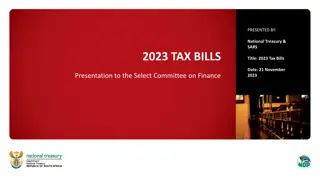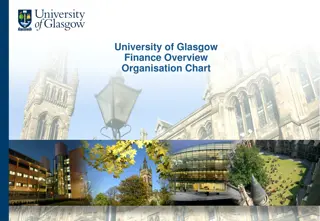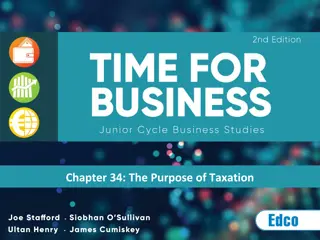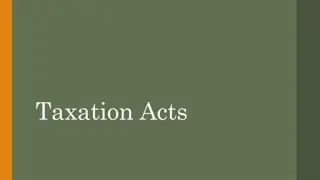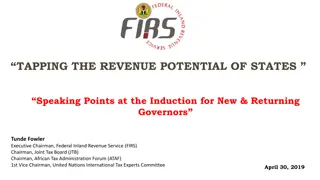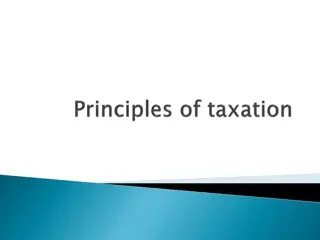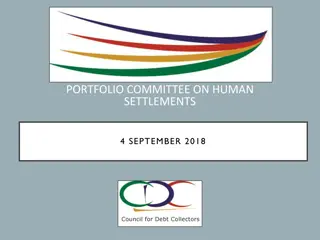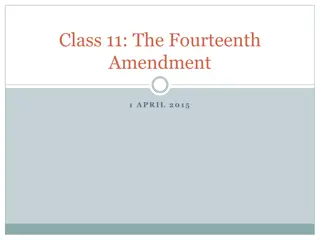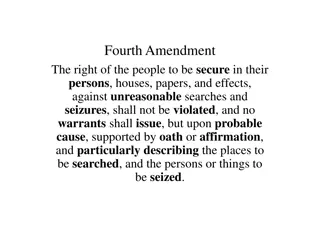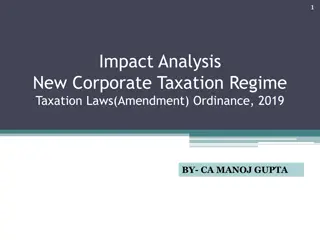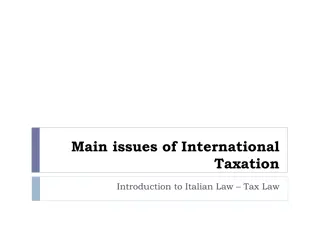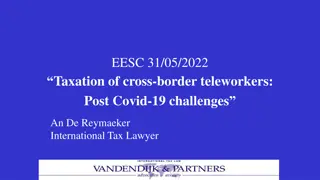Impact of Taxation Laws Amendment on Real People Home Finance
The Taxation Laws Amendment Bill proposes changes affecting non-bank lenders like Real People Home Finance, limiting their doubtful debts allowance to 25% of the IFRS 9 provision. This would result in an inequitable treatment compared to banks, impacting the sustainability of non-bank lending businesses. Real People Home Finance is a leading provider of unsecured finance for home improvements in South Africa, aiming to improve access to housing for South Africans through purpose-specific, affordable finance solutions.
Download Presentation

Please find below an Image/Link to download the presentation.
The content on the website is provided AS IS for your information and personal use only. It may not be sold, licensed, or shared on other websites without obtaining consent from the author.If you encounter any issues during the download, it is possible that the publisher has removed the file from their server.
You are allowed to download the files provided on this website for personal or commercial use, subject to the condition that they are used lawfully. All files are the property of their respective owners.
The content on the website is provided AS IS for your information and personal use only. It may not be sold, licensed, or shared on other websites without obtaining consent from the author.
E N D
Presentation Transcript
1 Real People Home Finance Standing Committee on Finance Taxation Laws Amendment Bill Stef Fourie
Presentation Outline and Objectives Problem Statement: What does this mean for the non bank lenders 1. Taxation Laws Amendment Bill Section 11 (j) doubtful debts allowance 2. Real People Home Finance & the developmental 3. Comparison to the Banks EQUITABLE? Credit Industry 4. Conclusion and Proposal Business model and impact of the Proposal No reason for differentiation in taxation treatment
Proposed Legislation Changes S11(j) 3 s11(j) provides relief to taxpayers where it is likely that debts owed to them will not be repaid: SARS s discretion, 2017 - banking businesses (S11 (jA)) Banks can deduct up to 85% of their IFRS 9 accounting provisioning charge. Bill proposes removing commissioner discretion for non bank lenders: allowance limited to 25% of the IFRS 9 provision IFRS 9: allows for an accurate reflection of the economic reality in relation to loan receivables Real People: early adopters of IFRS 9. The proposed legislation: leaves Real People with a deduction for tax significantly less than that accurately calculated for accounting purposes under IFRS 9. Compared to the allowance afforded to Banks + the economic realities faced by the industry, this Bill is inequitable and impact the sustainability of the business
Real People Home Finance Business Overview 4 About Home Finance Nationwide Footprint Leading specialist provider of unsecured finance for home improvements in South Africa, Loans originated via +- 900 build-ware merchants across the country (predominantly franchisees or independently owned), > 425 000 home improvement loans to date Customers: those who do not have convenient and/or cost effective access to alternative forms of finance, Significant loan underwriting, pricing, provisioning and administration expertise. Business Objectives Merchant Partners Sustainably improve lives of South Africans through greater access to housing, building materials and services through the provision of purpose specific, affordable unsecured finance, Support for build-ware merchants: access to a broader customer base. Smaller businesses, frequently owner- managed and struggling in the economic down-turn, rely on the turnover from credit sales, To provide a conduit for capital earmarked for housing to reach the consumer Note: Real People ensures funds used for housing purposes.
Home Finance Loan Offering 5 Offering Term loans, up to 48 months Max: R 120 000 Loan proceeds disbursed directly to the build-ware Merchant Flex-Build Product supports building projects though a 6 month draw-down period Product Pricing Principles The size of and interest rates offered on loans to take the following into account: The risk that borrowers will not make their monthly payments, The cost of borrowings to fund the loan book, Origination and servicing costs related to servicing the loan, The taxation charge. A taxation system that taxes taxpayers on income that has not been collected, or that is with a high level of probability ever to be collected, strains tax-payers impacts the sustainability of the business.
Impact of S 11 (j) amendment 6 Proposed s11(j) results in an economic loss to our business Allowing for 100% of IFRS 9 in s11(j) supports the long term sustainability of our business 10% 14% 8% 12% 6% 10% 4% 8% 2% 6% 0% 4% -2% 2% -4% 0% Profit before tax Tax with s11(j) charge at 25% Draft Cost of Capital Economic Loss Profit before tax Tax with s11(j) charge at 100% Cost of Capital Economic Profit
No basis for Non-Bank Alternative Treatment 7 Description Banks Real People + other non Bank lenders yes Comments Regulatory National credit Act Regulatory - Banks Act yes Both subject to onerous requirements yes No see comments Banks are deposit taking institutions and therefore are subject to prudential reserving requirements to protect public Depositors , not relevant to non-banks. Real People is funded through capital and loan agreements that also require minimum levels of capital (in excess of 20%) This reserving requirement likely more onerous than the banks Funding cost likely higher for non banks in the specialist focus unsecured risk segment Credit losses are typically far higher un-secured lending, therefore larger provisioning requirements Real People have an experienced credit team developed sophisticated statistical models which back test well and stand-up to expert independent audit scrutiny Funding Access to deposits Mainly secured IFRS 9 Banks and capital markets Mainly unsecured/ developmental IFRS 9 Types of lending Accounting Standards
In Summary 8 The tax allowance for doubtful debts is determined with reference to the accounting treatment, and the same IFRS standard regulates the accounting provisions for both, and the same auditors using the same practices, sign off on both. Both employ sophisticated statistical techniques to determine provisions for doubtful debts Insofar as capital, both have capital regimes, albeit one set by the SARB and the others by the capital providers/funding structures Therefore: no reason for differentiation. Non bank lenders lend proportionately more to the unsecured market, consideration needs to be given whether the percentages proposed in section 11 (jA) even if allowed for non bank lenders, would be adequate OR requirement for a new Section, say 11 (jB)? Real People would welcome a thorough consultation process and in order to determine the most appropriate allowance for non bank lenders, with particular reference the Developmental Credit Industry. Were the draft legislations as currently proposed enacted the outcome would impact the sustainability of the Real People business and other developmental credit providers, whilst providing an unfair advantage to the banks.



